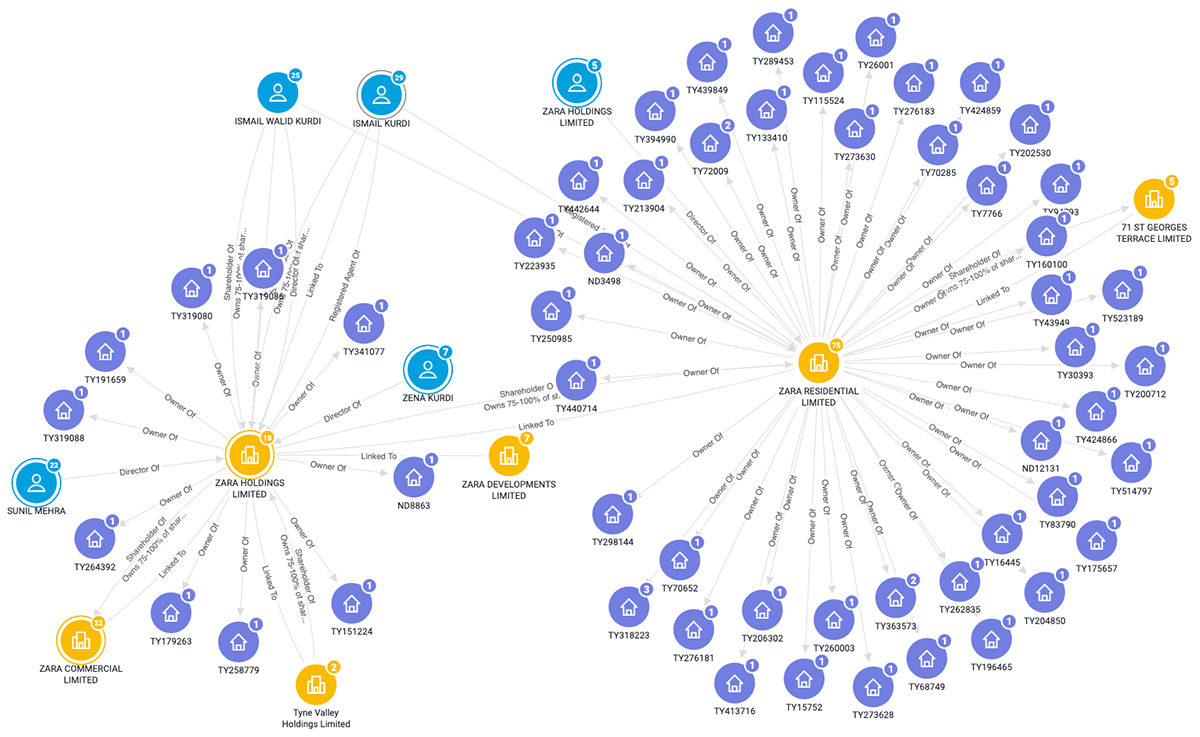Al-Kurdi and his family maintain a global network of companies, many of which are linked to real estate holdings. The Al-Kurdi family also controls multiple UK-based companies that hold residential and commercial properties — we use public records to highlight that network below.
Corruption in Jordan
Jordan’s public prosecutor ordered a series of seizures last month linked to high-ranking officials accused of corruption, according to local media. These actions align with Jordan’s sustained efforts to curb public corruption since the new prime minister took office in 2018.
Most Jordanians do not face traditional forms of corruption. Less than 5 percent of Jordan’s population paid a bribe for public services in 2016, according to Transparency International. Jordan’s corruption largely manifests in wasta — access to jobs, resources, licenses, etc. because of a family’s status or connections to governmental decision makers. The system of wasta leads to instances of corruption related to contracts, licensing, or seeking approval for large public works projects.
The government passed an anti-corruption bill last year that bars public officials from doing business with the government. The bill forced Talal Abu Ghazala, the Jordanian billionaire and founder of Talal Abu Ghazaleh Global, to resign from the senate because he holds government contracts.
The Case of Walid Al-Kurdi
Al Kurdi served as the CEO of the Jordan Phosphate Mines Company (JPMC) from 2007 to 2012. The Jordanian government holds a 41.4 percent stake in JPMC.
Under Al-Kurdi’s leadership JPMC awarded a series of maritime shipping contracts to a foreign company at rates questionably higher than what was on the market. The company simultaneously disregarded possible agreements with the Jordan International Chartering Company (JICC), which was more than 30 percent owned by JPMC at the time, according to local media. Public records from 2019 show that JPMC maintains a 15 percent stake in JICC.
JPMC also awarded a major contract to the Aqaba Development and Marine Services (ADAMS) company — owned by Al-Kurdi and his family — to ship 250,000 tons of phosphate from Jordan to Turkey in 2010. Beyond the phosphate contract, ADAMS ultimately secured 70 percent of marine shipping contracts issued by JPMC through Jordan’s southern port of Aqaba.
The Jordan Anti-Corruption Commission (JACC) considered this an abuse of power due to Al-Kurdi’s connection to ADAMS. JACC froze Al Kurdi’s assets and indicted him on charges related to abuse of power in December 2012.
Al-Kurdi fled to London on January 6, 2013 — the day before his testimony. He remains there despite numerous attempts by the Jordanian government to bring him back, including an Interpol red notice.
In June 2013, a Jordanian court tried and sentenced Al-Kurdi in absentia to 37 and a half years of hard labor and a $378.8 million fine for illegal profiteering and abuse of power related to contracts issued during his time as CEO of JPMC.
Al-Kurdi’s name continues to be referenced when discussing the issue of public corruption in Jordan. He is also married to Basma Bint Talal, King Abdullah II’s aunt, making his case a sensitive topic for the Jordanian royal family.
Al-Kurdi’s Business Network
Al-Kurdi is the son of a businessman. Ismael Al-Kurdi, Walid’s father, established one of the largest film production companies in the Arab world in Egypt — Dollar Film. The Al-Kurdi family retains control over it with Walid as CEO.
The family’s holdings have since expanded beyond Egypt and cinema. Walid and his children control dozens of companies across Spain, UK, Malta, and Jordan, according to public records. The most noteworthy of these companies is a UK-based real estate holding company — Zara Holdings Limited. The properties shown below are within the UK and linked to the family’s residential property holdings company — Zara Residential Limited. The family also controls commercial properties in the UK through Zara Commercial Limited. The two Spanish companies controlled by Saad Al-Kurdi, Walid’s son, are also real estate holding companies.

Fig.1: A screenshot from Sayari Graph highlighting part of the Al-Kurdi family’s real estate holdings in the UK.
Ongoing Settlement
Despite Al-Kurdi’s alleged criminal activities and the ensuing legal battle, if he settles with the government, he will be able to return to Jordan and continue doing business. “The deal will be a win for Al-Kurdi and a win for the government” according to a lawyer with inside knowledge of the case. Whether or not Al-Kurdi and the Jordanian government settle, the fate of Al-Kurdi’s global assets, and the extent to which he will continue to run his businesses remains unknown.
Photo Credit: I, Aviad2001 (CC BY-SA 3.0)